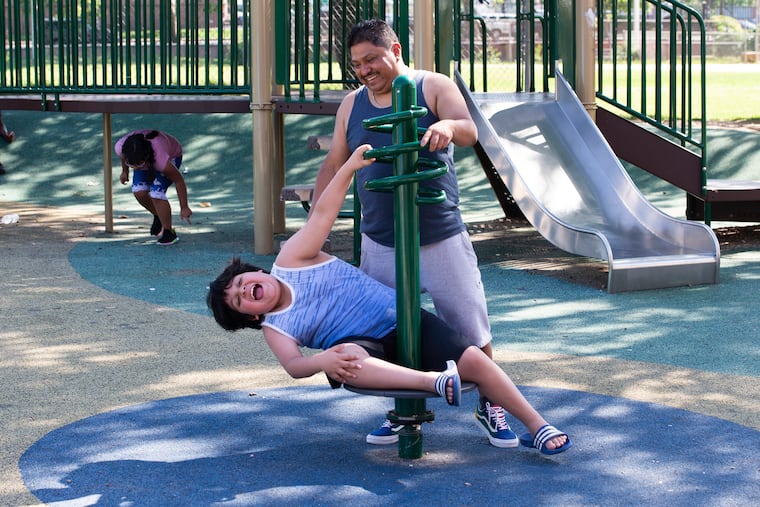Spanish-speaking families struggled to sign up for Parks and Rec summer camps. They organized to demand change.
Parks and Rec implemented changes, but families say more work needs to be done

It’s a perennial problem for working parents: how to keep kids entertained during the summer months.
Eréndira Zamacona, a mom of 8- and 10-year-old children, was delighted to learn that Philadelphia’s Department of Parks and Recreation hosts summer camps that feature sports, arts and crafts, and other educational activities.
But that delight dissipated after the Spanish speaker learned summer camp registrations have to be done by phone. She left messages for 10 rec centers and heard back from only one — the staffer left a message in English.
“As a mother and community organizer I’m disappointed and frustrated that the system isn’t working the way it should for kids,” Zamacona told The Inquirer in Spanish.
She decided to do something to address language barriers for families. Zamacona, who is with the organizing group Comité de Trabajadorxs de Restaurant, worked with other groups to lobby Parks and Recreation to make camp information accessible in other languages.
» READ MORE: Free and low-cost summer camps in Philadelphia
Zamacona’s experience is just one part of Philadelphia’s struggle to help the almost 11% of residents who speak English less than “very well,” according to U.S. Census data.
All city agencies have to provide language access services and have language access plans. In the 2021 fiscal year, the city reported more than 88,500 interpretation transactions by phone, video, or in person. But as experienced by Zamacona and other families, there can be gaps. Even after Parks and Rec tried to address the issue, some families say the process of enrolling their children could be smoother.
Spanish-speaking families brought the issue of language accessibility to an April meeting with Parks and Rec and other stakeholders. Zamacona recounted how she went to a recreation center in person after the calls led to a dead end. Staff instructed her to call the main office because no one on site spoke Spanish or knew how to access interpreters the city makes available by phone — an experience that made her feel unwelcome.
The department was receptive to testimony and put a plan in place.
“When we fall short, we acknowledge what went wrong and find ways to rebuild trust,” said department spokesperson Maita Soukup.
According to the department, it responded by training staff from 23 recreation centers to use language interpreter phone lines. It also tapped into more than 400 bilingual school guidance counselors to share camp information.
» READ MORE: Philly will open 50 of its 65 pools this summer. Here’s the schedule.
The city also held four in-person information sessions with interpreters in May, at which more than 20 campers signed up. By Parks and Rec’s count, at least nine of those kids are currently in a parks and recreation camp after some families chose to go elsewhere — a count Zamacona disputes.
“We worked quickly to address the barriers these families presented, and as a result, we were able to put new practices in place that we hope will mean more families receive information about Parks and Rec programs in their native language,” said Soukup.
But Zamacona is not claiming victory yet. She said much of the effort to let families know about the information sessions fell on organizers, which included 215 People’s Alliance and the Coalition for Restaurant Safety and Health. Meanwhile, parents like Veronica Perez offered mixed reviews of the sessions’ utility.
“There were no prices, no information on scholarships, nothing,” said Perez in Spanish. “I didn’t even see an interpreter.”
Perez, whose first choice was unavailable to her, said the second choice offered was a mile away and too far for her and her 7-year-old daughter. Perez opted to try again next year.
Another parent, Fernando Melo, said the follow-up emails about enrollment were in English and when he went to his rec center to ask about scholarships mentioned in the information sessions, employees were unable to help. Still, Melo completed the enrollment process for his son.
“He needs to be in activities because we can’t just have him stuck at home,” said Melo in Spanish. “And I can’t really take the kids places, since I spend most of my time working.”
» READ MORE: Philly will begin to open dozens of recreation centers on weekends by this fall
Melo said the logistical hurdles beat the alternative of going through private summer camps that could range from $800 to $1,000 for the summer. Last year, the only reasonable summer camp slot was in Fishtown, miles away from the family’s South Philly neighborhood. Melo adjusted and cut his hours as a restaurant cook to make sure he’d have time to take the bus to drop off and pick up his son. The Parks and Rec camp his son is going to this year is cheaper and just blocks from their home.
Zamacona said she hopes the city will improve the process next year.
“They say that they’re going to get better and are asking us to give them a chance. Fine,” said Zamacona. “We’ll need to keep putting pressure on them. Otherwise, they might act like the problem is solved and things will go back to being the way they were before.”
The Philadelphia Inquirer is one of more than 20 news organizations producing Broke in Philly, a collaborative reporting project on solutions to poverty and the city’s push toward economic justice. See all of our reporting at brokeinphilly.org.